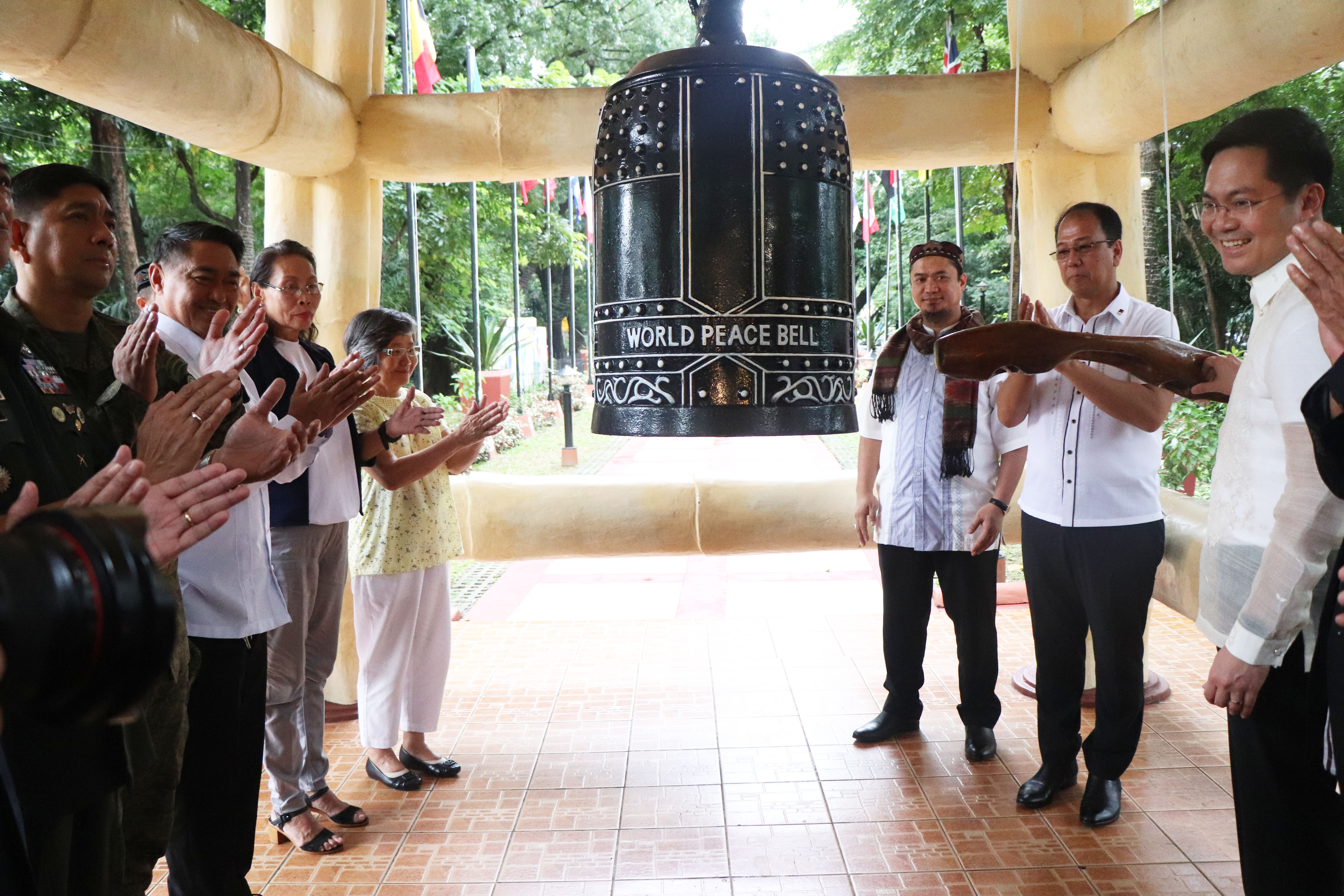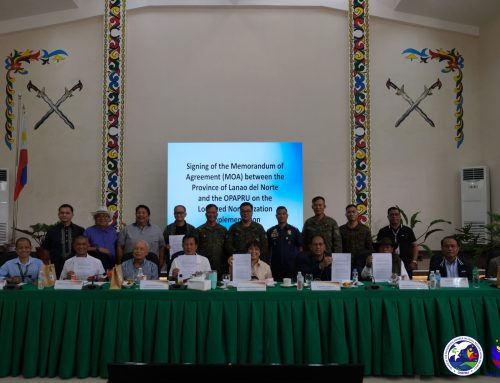QUEZON MEMORIAL CIRCLE, QUEZON CITY (2 September 2019)– The ratification of the Bangsamoro Organic Law (BOL) and the establishment of the Bangsamoro Autonomous Region of Muslim Mindanao (BARMM) top the list of the Duterte Administration’s achievements as the country celebrates National Peace Consciousness Month.
In his message for this year’s Peace Month Celebration, Presidential Peace Adviser on Peacea, Reconciliation and Unity Carlito G. Galvez, Jr highlighted the gains of the Bangsamoro peace process, which has spanned more than two decades and several administrations.
“What used to be unimaginable decades ago are now taking place right before our eyes; former rivals who used to fight each other during armed confrontations are now engaged in peaceful dialogue and are working side by side in the name of peace,” Galvez said.
To kick off the opening of peace month, the peace adviser will lead the ringing of the world peace bell, together with Cabinet Secretary Karlo Alexei B. Nograles, Quezon City officials,
Office of the Presidential Adviser on the Peace Process (OPAPP) executives and other peace partners.
The theme for this year’s National Peace Consciousness Month celebration is “Tapang at Malasakit para sa Kapayapaan,” with hashtags #FilipinosForPeace and #PilipinoParaSaKapayapaan.
This is a call to action for all Filipinos to unite and work for peace, and is in line with the Duterte Administration’s Six Point Peace and Development Agenda.
OPAPP Director Pamela Ann S. Padilla-Salvan, head of the Peace Policy Unit and chairperson of the technical working group of the 2019 Peace Month Celebration, explained this year’s theme.
“Differences in ideology, beliefs, culture and values, these are normal. In the history of human existence, there has always been conflict. What’s important is that you are able to manage it. You are able to resolve it without using violent means,” Padilla-Salvan said.
Onward Bangsamoro
Signed in 2014, the Comprehensive Agreement on the Bangsamoro, has two tracks: the political-legislative track, which includes the passage and ratification of the BOL and the creation of BARMM, and the normalization track, which has four clusters: security aspect, socio-economic development, confidence-building measures, and transitional justice and reconciliation.
Under the security aspect is the decommissioning of Moro Islamic Liberation Front (MILF) combatants and their weapons, and the transformation of their camps into peaceful and progressive communities.
On Sept. 7, President Rodrigo Roa Duterte will witness the public launching of the decommissioning process, wherein 1,060 combatants and 920 weapons are slated to be decommissioned.
Meanwhile, the Task Force for Decommissioned Combatants and their Families under the socio-economic cluster signed a Memorandum of Agreement with the Department of Social Welfare and Development for the timely delivery of cash assistance to the decommissioned combatants.
For confidence-building measures, the Joint Task Force on Camps Transformation is set to initially build 14 small-scale infrastructure projects across six MILF camps, such as solar-powered solar systems, post-harvest facilities, hanging bridges and community centers.
Under the transitional justice and reconciliation cluster, a series of inter-agency meetings and workshops were held to determine the best interventions to address the historical grievances of the Bangsamoro people.
The results of these meetings will be reviewed by the GPH and MILF Peace Implementing for appropriate action.
“When we talk of peace, it’s not just the silencing of the guns. The peace that we are trying to attain is more than the end of armed conflict,” Padilla-Salvan said.
“It’s really addressing the root causes of armed conflict, and it’s transforming society so there’s respect, tolerance, harmonious pluralism and full respect of human rights,” she added.
Galvez also cited President Duterte as a source of inspiration for the Bangsamoro peace process who said in his 4th State of the Nation Address, “It is my hope that the Bangsamoro Transition [Authority] will fast-track the establishment of a regional government that will secure and comfortable life for Muslim brothers and sisters, and all indigenous communities in the Bangsamoro Regions.”
Engaging the MNLF as peace partner
OPAPP continues to engage the Moro National Liberation Front (MNLF) through peace dialogues with the organization’s two groups headed by Nur Misuari and Yusop Jikiri.
On August 23, 2019, President Duterte and Chairman Misuari agreed to form the GPH-MNLF Coordinating Committee, which will be tasked to address the Abu Sayyaf problem in Sulu, and convince MNLF members and their families to partner with the government.
Meanwhile, the MNLF-Jikiri group had thrown its support behind the BOL and BARMM by helping to campaign for the law’s passage.
As a testament to the group’s firm commitment to peace, 10 representatives of the MNLF were sworn in as Bangsamoro Transition Authority members by President Duterte last February.
In the meantime, under its PAyapa at MAsaganang PamayaNAn (PAMANA) program, the national government continues to provide much-needed development assistance to remote, conflict-affected communities across the country.
KAPATIRAN for peace
Last July, the Philippine Government and the Rebolusyonaryong Partidong Manggagawa ng Pilipinas/ Revolutionary Proletarian Army/Alex Boncayao Brigade – Tabara Paduano Group (RPM-P/RPA/ABB-TPG) signed the Clarificatory Implementing Document to the 2000 peace agreement.
The CID is the absolute and final settlement to the peace pact forged by the two parties, and covers the decommissioning of 727 RPM-P/RPA/ABB-TPG members which is scheduled on September 16.
A three-year normalization plan for the group, which is now legally registered as KAPATIRAN, is now being developed.
The Joint Enforcement and Monitoring Committee, co-chaired by Department of National Defense Undersecretary for Operations Cesar Yano and Veronica Tabara, shall oversee the implementation of socio-economic and security interventions for KAPATIRAN.
Why we celebrate peace month
Pursuant to Proclamation No. 675 issued on July 20, 2004, National Peace Consciousness Month is annually commemorated in the country every September.
The occasion aims to increase the Filipino people’s consciousness and understanding of the peace process, as well as strengthen and sustain institutional support for it.
“We hope that all these achievements will help us strengthen the foundations of peace, open up more opportunities for multi-stakeholder dialogue, and build a better and brighter future for our countrymen,” Galvez said.
He also referred to the President’s recent statement where he called on the military to decisively put an end to the decades-long communist insurgency.
“I am telling the military, kindly end it now. We can’t afford to pass it in the next generations. It has to be now,” Duterte said in his speech during the 31st anniversary of the Comprehensive Agrarian Reform Program in Quezon City.
Galvez concluded his message with a quote from St. John Paul II who said during the 2004 World Day of Peace: “Only a humanity in which there reigns the ‘civilization of love’ will be able to enjoy authentic and lasting peace.” ###












